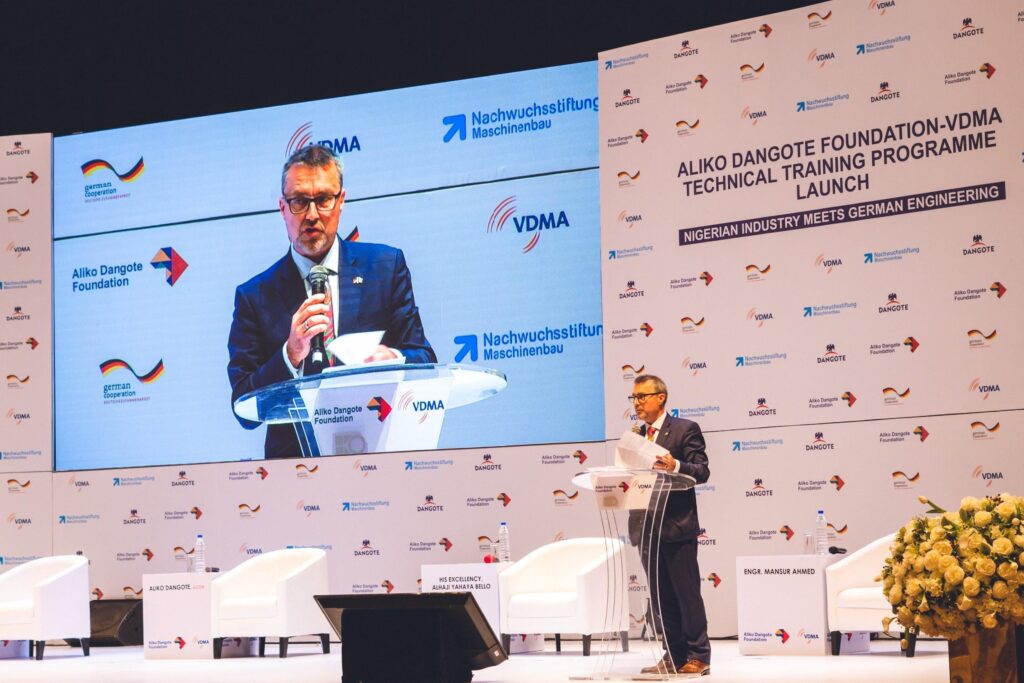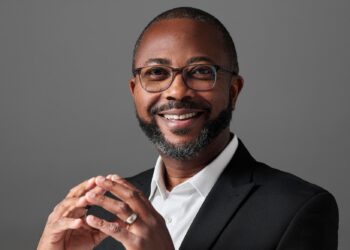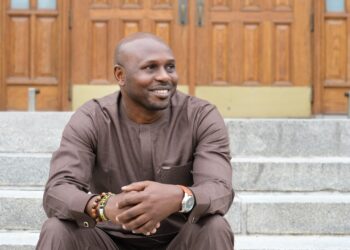
How did you veer into the Technical and Vocational Education and Training (TVET) sector? Is this something you had always wanted to do?
In a way I will say, yes. When I finished school, that was the highest level in Germany, I then had the opportunity to go to university for further studies. But I made the decision to first do an apprenticeship training because I saw a good opportunity in working with my hands and to see real work in the workshop. And so I took up an apprenticeship training for three years in Germany. And that is how I came into it. If you take a look at Germany’s industrial sector, you will see that there’s a great mix of people running through vocational education and training and both the graduates as well as the artisans, play an important role in our industry. We need all the different levels. In addition, starting with an apprenticeship training is very good. It is particularly good for personal development, which is very, very important.

It’s often said in Nigeria that everyone wants to be a General and no-one wants to be a foot soldier. And we all know wars cannot be won without foot soldiers.
Yeah, but you know, I would never say foot soldier and general or whatever. Like you know, everybody has a role to play and that is very important. Concerning the reputation of TVET, people going through vocational education and training can attain a very high level educationally, depending on how far they wish to go. Especially if the system gives one the opportunity to work for a while before topping it with further education at the university. So, a TVET apprenticeship will provide you with a very good foundation of practical understanding and experience. This workshop experience can be extremely valuable for someone who trains as an Engineer for example. Marrying practice with theory taught in class. To use myself as an example, I gained practical knowledge from my apprenticeship as an artisan, working as a coach builder at BMW in Germany. But the summary is that once one had decided on that chosen career path, one just had to be laser focused and determined to succeed. And seeing my peers channel all of their strengths and resources into our medical studies inspired me personally. It really depends on how far you want to go with it. That’s why I’m not a fan of that General and foot soldier analogy.

There’s a belief that tertiary institutions in Africa are constantly playing catch up with society. Would industry to university programmes help?
So, let’s say that there should be a very good interlink between industry and universities and this can even start in the study courses so it begins early. When I worked at the university educating engineers, I made links with industry, in different phases of the study course, so that there might be some things even at the beginning of the study course that would be useful to the students.
For example, maybe engineering students are given a task to build something. It can be an artificial thing, let’s say a vehicle that can drive on snow but also on the road. And you just let the students think about that. And you know, in the first semester, they may not be good enough to do prototyping and to know the necessary steps but it gives them an opportunity to really think and this will also motivate them to delve deeper into their study course and think futuristically. Of course such a task would be so much more motivating for the students if it was to emanate from industry. And should the task come nearer to graduation, it would make it very close to the real thing as they will need to go there and present their results. Under normal circumstances, university professors are often approached by industry to help them solve some of their challenges and this would entail their students being drafted in too, to work with them. This is particularly so in the area of material science, so though the company may have scientists in its employment, the university Professors do nothing other than conduct research on scientific challenges, positioning them well to find solutions. This provides the students involved with a wonderful opportunity to solve real life problems. So yes, the interlink between industry and universities is quite crucial.So we started to collaborate with different players in these countries and in Nigeria we collaborated with the Dangote Foundation. Together we introduced a three-year course at the Dangote Academy in Obajana.

What major project did you carry out in Nigeria when you led the Africa initiative at VDMA? Was it successful?
Yes, it was. You know, the initiative is about training and education on TVET, which gives the beneficiaries an opportunity to work with the latest technology that is being used across the world. And sincerely speaking, production in the countries where we were involved in this initiative, namely Nigeria, Botswana and Kenya, is coming up a lot and in Nigeria in particular, you can see this every day. To be at the forefront of industry production, you must have the latest technology and then you need people who have the skills to operate the machines, to work with the machines, to repair them and to also do maintenance for these machines. And these people, we could not find. So we started to collaborate with different players in these countries and in Nigeria we collaborated with the Dangote Foundation. Together we introduced a three-year course at the Dangote Academy in Obajana that was a general course for industry mechanics. It was a three-year apprenticeship training for people to be skilled to do all that I mentioned earlier – so to enable them to work with the machines, understand the machines, understand technology and so on, and yes, it was very successful. We had 120 students coming in. That was the first batch. After 18 months, we released 100 to the industry and the remaining 20, who were the best, we kept on for another 12 months so that they could be trained to the highest level, matching their peers anywhere in the world. When they were through and graduated, a second batch of 120 came in. This initiative was very good as it gave the students excellent practical training. So yes, it was successful. Also, the collaboration with the Dangote Academy was very good and we liked it so I must give them credit for that. And as I was informed, all the graduates got into jobs.

Great. That is definitely a success story but now tell us about the beautiful TVET success story in Botswana.
You know, the project in Botswana was on a much smaller scale as the population in Botswana is just a fraction of Nigeria’s population. There, we trained them in mechatronics which is a combination of mechanics and electronics, and nowadays with smart technology coming into it as well. So we had eight people in the first run and the 2nd batch had 16 people and it has been increasing like that. The level, I would say, is like the project in Nigeria. The goal was to have an international quality of graduates coming out with all the skills that are needed to run the highest technology anywhere in the world. So, is that in an African country?
Is it in Germany? Is it in South America? Or wherever. And this mechatronics programme got an accreditation too, which we received very quickly. At the end of the programme, we were able to support two of the graduates to come over to Germany for an attachment and they got placements in a company in the automation industry where they were able to both apply and acquire further skills in mechanical, IT, electronics and sensor technology. So these people came over here to Germany, did their three weeks attachment before returning to Botswana. But then the company in Germany called me just a few days later and said, listen, these people were brilliant on the skills level, but also on the personal skills. They really liked how they behaved and how they worked and everything. So they asked if they could offer them permanent employment and bring them over to Germany. This incident speaks directly to the goal of a good education which is to enable one to start a career and for sure, this project opened up such an opportunity. These young men were offered employment contracts by the company in Germany and after a long and tedious process due German bureaucratic red tape, they eventually moved to Germany and they are both working in Germany as artisans now. Just like I mentioned when telling my own TVET story earlier, about the opportunities that opened up for me after doing my apprenticeship training and then working for BMW, the same applies to these young men. The world is their oyster now, if they can make good choices. They can go ahead to do more courses, gain even more experience after which the possibilities are endless. After some years they can even return to Botswana to establish their own automation company and support production that is already taking place in their country.

Has this success story encouraged more people to follow the TVET path in Botswana?
Oh yes, it has. Like you mentioned at the beginning, the reputation of TVET is an important part. So, what I have always said is that we need the best people going for TVET and not just the ones who failed at school. Sure, TVET provides those who are less academically inclined with wonderful opportunities to succeed in life and that’s very important but we also need the very academic individuals coming from school who have an inclination for practical things and are gifted with their hands. As we have already seen, it can open up opportunities to live and work abroad and of course that has led to more people in Botswana to seek that type of education. Each batch that came for the training was larger than the previous and this has led to Botswana’s First Lady becoming the patron for TVET and for education. This itself has attracted more attention to TVET in that country. People are also making more inquiries about the course from our graduates. As for the graduates, I am still in contact with many of them in both Botswana and Nigeria who seek my opinion on different things. Some will ask where they can work with their acquired skills and I assist here and there. So yes, more people are now motivated to follow the TVET education path. And you know what? Germany’s First Lady, Elke Büdenbender has now taken over as patron of the TVET initiative too. Because, like she says, it gives young people a lot of opportunities and it helps them to play a role in upcoming industries and in upcoming countries and so on. This visible support by a First Lady is very important. Support from big industry players would also go a long way to convince people about how good TVET is and would go a long way in strengthening its reputation.

How can deliberate government policy to push the technical education agenda positively affect a nation’s economy?
I think it has to come with more industrialization and that means there is a need to also extend the value chain and so on. If this is done, TVET will naturally go with it. That industrialization aspect is very important. The interlink between government and industry is very important just as the interlink between tertiary institutions and industry mentioned earlier on too. You see, when there’s a desire and a push to improve production and extend the value chain within the country, TVET will go along with it, bringing along the people who will want to be involved with the technical and practical side of that, so such people will need to receive the required technical education. But just as I said earlier, technical education is important in tertiary education as well. Engineers need to have a lot of practical experience to really bring their ideas into real life. That is something that is very important. And I think that is something that needs to be done more. So the right policies need to be made, meaning that education should not just be something that takes place at school and with learning theoretical things. It also needs to be practical. But before any of these can really have any effect, the technical education sector must be well funded. The desire to drive technical education must reflect in the budget. Unfortunately, most times, this desire comes to an end when it’s time to adequately fund it. That is what I’ve seen very often. So the thought is there to support this kind of education but the desire isn’t backed up with sufficient provision for it in the nation’s budget. This really should not happen as it’s very important that we invest in young people and in skills development. Beyond merely increasing industrialization, it’s crucial that these young people play a role in that. I therefore think governments need to assume this responsibility and understand that it is actually their responsibility to finance this sector while also realising that a collaboration with industry would give the best results.

(Read the concluding part of this interview in the April issue).
______________ Dr. Norbert Völker is Managing Director of Didacta, the Association for Education Suppliers in Germany. His goal is to make education – from early childhood to k-12 and tvet up to tertiary and further education available to everyone. The Didacta Association advocates that education is a matter of relevance to society as a whole, and that it is the responsibility of all key members of society to work in unison to ensure that educational opportunities are available to all. The Didacta Association accepts the challenges posed by digital transformation and promotes the continuous and innovative development of educational systems. Didacta Association hosts the internationally renowned professional trade fair for the education suppliers – the largest event of ist kind “didacta” in Germany including conferences and exhibitions. Before Dr. Norbert Völker was Head of Education International and Project Director of the Initiative “Skilled Workers for Africa” at the German Machinery and Equipment Manufacturers Association (VDMA) in Germany – comprising 3600 engineering member companies, making it the largest association all over Europe. With more than 80% of exports, this industry needs skilled workers worldwide. His project ran successfully in three African countries: Nigeria, Kenya and Botswana and cooperated with African training centers and companies to produce industry ready skilled workers – preparing them for Industry 4.0. Together they developed the first Mechatronics apprenticeship training (3 years, level 5) in Botswana and Maintenance Technologists (18 + 12 months) in Nigeria and offered technical short courses such as hydraulics, pneumatics, programmic logic controller (plc) and maintenance in Kenya also. Dr. Völker started his career path with an apprenticeship to a coach builder at BMW in Frankfurt Germany, followed by a study course in vocational education at the Technical University of Darmstadt. The combination of practical-technical skills and the knowledge of education gave him the chance of heading the teaching and learning at the Institute of Material and Testing at the Technical University of Darmstadt. There he modernized the teaching and learning especially by integrating cooperative projects with industry and by adding Information Technology Solutions. After finalizing his doctorate in engineering education, he left Germany in 2009 with his family and worked for the Ministry of Education in Botswana as a TVET specialist and advisor. Back in Germany in 2011 he joined the VDMA and managed the project “Maschinenhaus” that consulted more than 30 universities for better teaching and learning in mechanical and electrical engineering study courses before he led the Africa initiative at VDMA and changed to be managing Director at Didacta in 2024. LinkedIn: Dr. Norbert Voelker


















































































 EduTimes Africa, a product of Education Times Africa, is a magazine publication that aims to lend its support to close the yawning gap in Africa's educational development.
EduTimes Africa, a product of Education Times Africa, is a magazine publication that aims to lend its support to close the yawning gap in Africa's educational development.